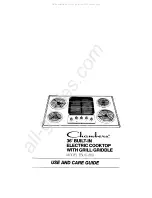
3
• Remove all tape and packaging wrap before using the
cooktop. Destroy the carton and plastic bags after unpacking
the cooktop.
Never allow children to play with packaging material.
Do not remove the model/serial plate attached to the cooktop.
•
Proper Installation—Be sure your appliance is properly
installed and grounded by a qualified technician in accordance
with the National Fuel Gas Code ANSI Z223.1 latest edition in
the United States, or in Canada CAN/CGA B149.1, and CAN/
CGA B149.2, and the National Electrical Code ANSI/NFPA No.
70—latest edition in United States, or in Canada CSA Standard
C22.1, Canadian Electrical Code, Part 1, and local code
requirements.
Install and/or adjust only per installation
instructions provided in the literature package for this cooktop.
Ask your dealer to recommend a qualified technician and an
authorized repair service. Know how to shut off gas supply at the
meter and disconnect the electrical power to the cooktop at the circuit
breaker or fuse box in case of an emergency.
• User Servicing—Do not repair or replace any part of the
appliance unless specifically recommended in the manuals.
All
other servicing should be done only by a qualified technician. This
may reduce the risk of personal injury and damage to the cooktop.
• Never modify or alter the construction of a cooktop by
removing panels, wire covers, or any other part of the product.
Stepping or leaning on this cooktop can result
in serious injuries and may also cause damage to the cooktop.
Do
not allow children to climb or play around the cooktop.
• Storage on Appliance—Flammable materials should not be
stored on the cooktop, near surface burners.
This includes
paper, plastic and cloth items, such as cookbooks, plasticware and
towels, as well as flammable liquids. Do not store explosives, such
as aerosol cans, on the cooktop. Flammable materials may explode
and result in fire or property damage.
Do not store items of interest to children in the
cabinets above the cooktop.
• Do not leave children alone—Children should not be left alone
or unattended in the area where an appliance is in use.
They
should never be allowed to sit or stand on any part of the appliance.
• DO NOT TOUCH SURFACE BURNERS, GRATES, OR AREAS
NEAR THESE BURNERS.
Surface burners may be hot even though
the flames are not visible. Areas near surface burners may become
hot enough to cause burns. During and after use, do not touch or
let clothing or other flammable materials touch these areas until
they have had sufficient time to cool. Among these areas are the
cooktop and the surfaces facing the cooktop.
• Wear Proper Apparel—Loose-fitting or hanging garments
should never be worn while using the appliance.
Do not let
clothing or other flammable materials contact hot surfaces.
NEVER use this appliance as a space heater to
heat or warm the room. Doing so may result in carbon monoxide
poisoning.
• Do Not Use Water or Flour on Grease Fires—Smother the fire
with a pan lid, or use baking soda, a dry chemical or foam-type
extinguisher.
•
When heating fat or grease, watch it closely.
Fat or grease may
catch fire if allowed to become too hot.
•
Use Only Dry Pot holders—Moist or damp pot holders on hot
surfaces may result in burns from steam.
Do not let the pot
holders touch the flame or burners. Do not use a towel or other
bulky cloth instead of a pot holder.
•
Do Not Heat Unopened Food Containers—Buildup of pressure
may cause container to burst and result in injury.
•
Know which knob controls each surface burner
. Always turn the
knob to the LITE position when igniting the burners. Visually check
that the burner has lit. Then adjust the flame so it does not extend
beyond the edge of the utensil.
Use Proper Flame Size
—
Adjust flame size so it
does not extend beyond the edge of the utensil.
The use of
undersized utensils will expose a portion of the burner flame to direct
contact and may result in ignition of clothing. Proper relationship of
utensil to flame will also improve efficiency.
Do not use stove top grills on your sealed gas
burners.
If you use a stove top grill on a sealed gas burner, it will
cause incomplete combustion and can result in exposure to carbon
monoxide levels above allowable current standards. This can be
hazardous to your health.
• Use proper pan size
—This appliance is equipped with one or
more surface burners of different sizes. Select utensils having flat
bottom large enough to cover the surface burner. The use of
undersized utensils will expose a portion of the surface burner to
direct contact and may result in ignition of clothing. Proper
relationship of utensil to the surface burner will also improve
efficiency.
• Utensil Handles Should Be Turned Inward and Not Extend
Over Adjacent Surface Burners
—To reduce the risk of burns,
ignition of flammable materials, and spillage due to unintentional
contact with the utensil, the handle of the utensil should be
positioned so that it is turned inward, and does not extend over
adjacent surface burners.
IMPORTANT SAFETY INSTRUCTIONS
Read all instructions before using this appliance.
Save these instructions for future reference.
This guide contains important safety symbols and instructions. Please pay special attention to these symbols and follow all
instructions given. Here is a brief explanation of the use of these symbols.
This symbol will help alert you to situations that may cause serious bodily harm, death or property damage.
This symbol will help alert you to situations that may cause bodily injury or property damage.


































